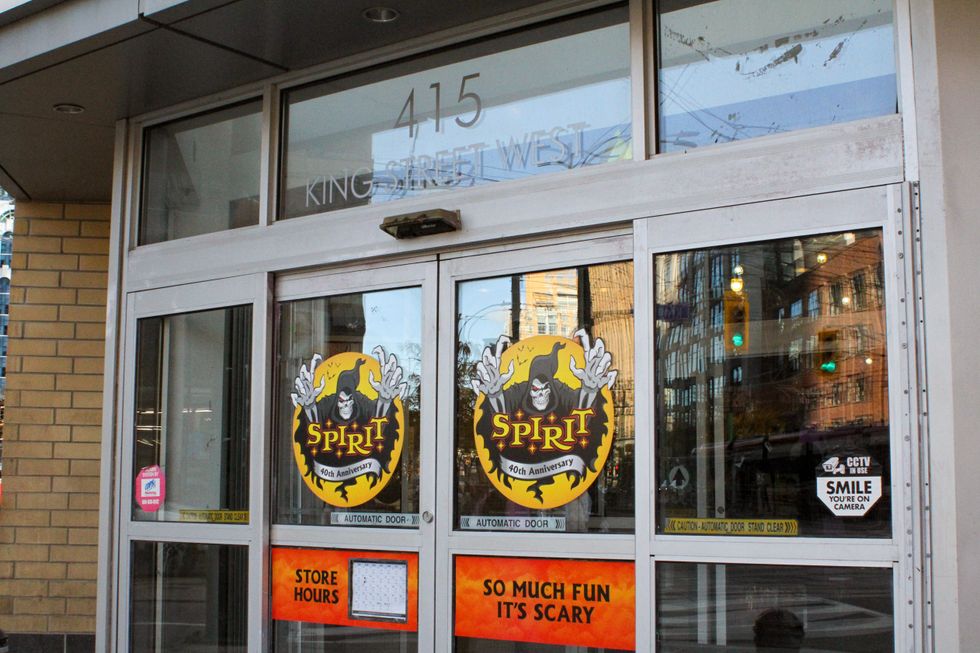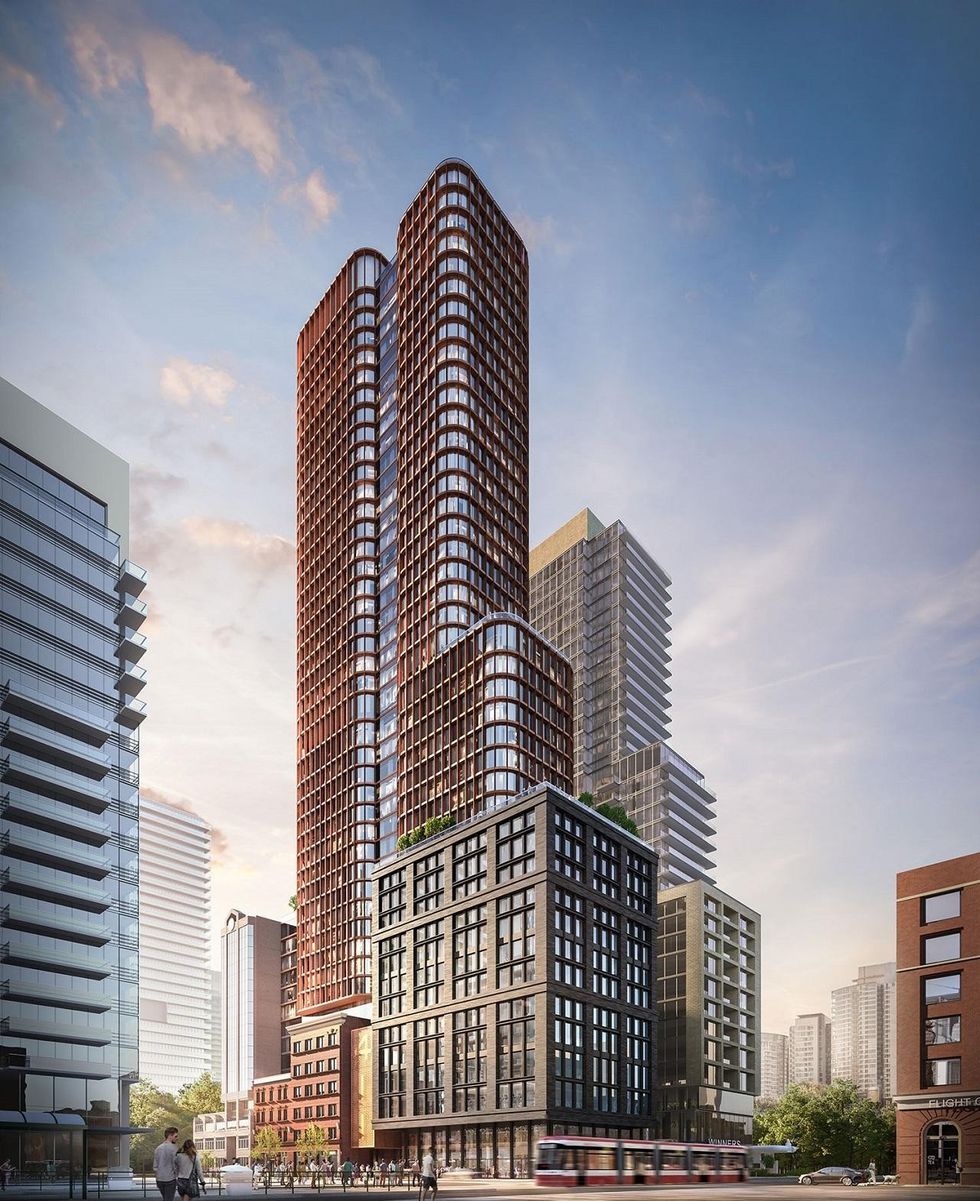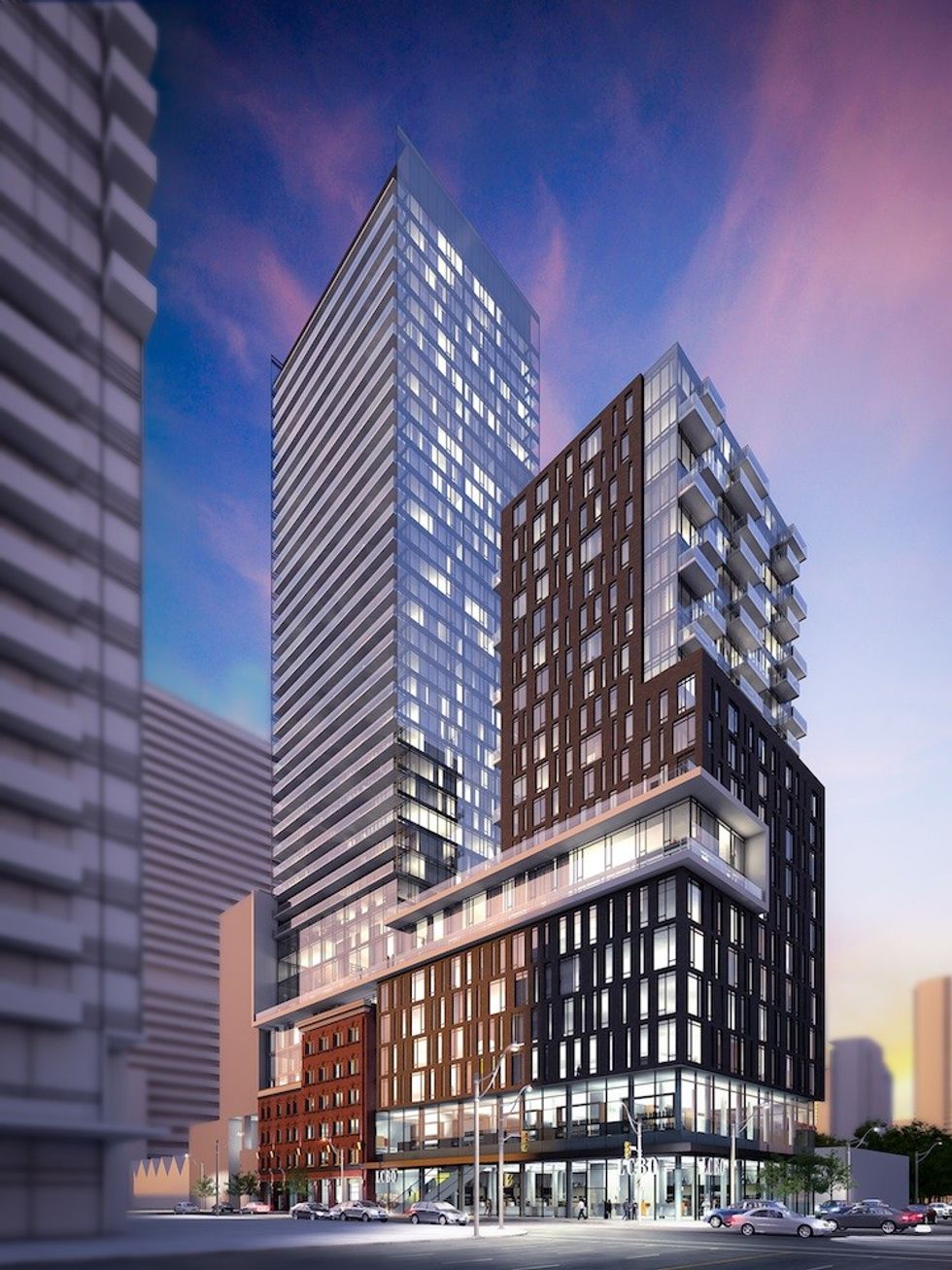In the later weeks of October, the southeast corner of Toronto's King West and Spadina intersection is bustling with fervid shoppers trying to secure this year's Halloween costume, often standing in a painfully long line to do so.
They're patrons of the sprawling Spirit Halloween pop-up store that has become an anticipated fall fixture at 415 King Street West — a one-storey beige brick building that used to be an LCBO until the liquor store closed the location in 2019. Torontonians in the surrounding downtown area have come to rely on the Halloween store, nabbing up masks, fake blood, and spooky sound machines that play ghostly noises on a loop. But come November, it turns into another ghost town of sorts.
Apart from the seasonal pop-up shop, the property is best known for sitting eerily vacant the rest of the year, which begs the question: How can such a prime piece of real estate at the intersection of two main throughways in a city that is incredibly expensive afford to sit there boarded up and unused?
The answer, of course, is condo development. This is Toronto, after all.

The property is owned by North York-based TerraCap, who purchased the site back in 2007 for $6.3M, according to the real estate investment company's website. They leased the space to the LCBO on a 15-year term, with an option to terminate after 10 years "to accommodate any redevelopment opportunities."
Cut to 2019. TerraCap, along with developer Great Gulf, submitted plans to the City of Toronto to redevelop the site (along with the neighbouring 401-409 King Street West) into a glossy 45-storey tower with 435 condo units, a luxury hotel, and a whole slew of high-end amenities from expansive green roofs to a fitness club and a rooftop bar. It's the kind of place that would attract well-off young professionals wanting to experience the pinnacle of downtown condo living.
The application was circulated to the various City divisions and agencies in January of the following year, and it was soon found to have met all of the City's requirements in terms of what needs to be included in an application. And then... crickets.

No progress has been made on the application since then, and the space at 415 King West — all 11,373 sq. ft of it — is being advertised for short-term leases of one year only. It's available immediately, according to the listing.
Toronto's City Planning division tells STOREYS that the application hasn't moved forward as it's "awaiting a further re-submission from the applicant," but had no information on the cause of the three-year holdup. TerraCap did not respond to a request for comment and GreatGulf declined to comment on the project.
This isn't the first time the developers have wanted to change their plans for the site. An initial application was submitted nearly a decade earlier, back in 2010, by TerraCap and then-development partner Tridel. Those plans called for a 39-storey tower with 443 residential units and retail space on the first two floors. The plans changed over time, with new submissions adding 17 more storeys and making changes to the design, and in 2016, after no timely decision from the City, the developers appealed to the Ontario Municipal Board (OMB) — now the Ontario Land Tribunal.

At the time, the City of Toronto took the position that the proposal, having climbed to 56 storeys, represented "an overdevelopment of the subject site." The City and the developers then participated in mediation and came to an agreement as to what the building should have: a maximum height of 145 m, at least 10% of the units having three or more bedrooms, and a partial retention of the heritage structures along King Street. The OMB found that these plans should be approved, calling it a "desirable form of intensification."
The newer — and shorter — 2019 development application appears to reflect what was agreed upon at the OMB. And yet, we keep waiting.
Even still, with the "pending re-zoning" — which is what is needed to redevelop the property — TerraCap claims the combined King West sites to be worth "at least $50M."
The Development Pause
Development properties sitting stagnant for years isn't uncommon in Toronto, and in certain circles, the finger always gets pointed at the landowner for supposedly sitting on the property, waiting for land values to increase before turning a major profit. Jeremiah Shamess, founder of Colliers Private Capital Investment Group, says this is something he hears talked about quite a bit, but isn't something that's happening in reality — not to any meaningful degree, anyway.
"The active developers in the city that make up the majority of the units being built are what are called syndicated developers," Shamess explained. "That means that the minute that they buy a site, they have investors that are counting on a return for their money. The majority of these investors use a metric which is a time value of money, meaning that when I invest in your project, the quicker I get my money back, the higher the return [....] So, to speak to the majority of the developers in the market, they are not going to sit on a site for no reason. It just doesn't happen from what I see."
Where you will maybe see that happen on the rarer occasion, Shamess says, is with a commercial property, like a retail frontage, that was bought two or three decades ago for a lower price.
"They don't have any mortgages on it and they're making a return based on the income [it already generates] — those are the investors who can sit and wait and have no clock against them in terms of actually building projects," Shamess said. "But they're the minority."
So, what's the typical hold-up then?
Well, money, usually. A lack of it or a hesitancy to spend it.
"You have a significant amount of costs that go into getting [a development site] through the entitlement process — entitlement meaning rezoned, permit-ready, shovel-ready land — and so even in that process when you have shovel-ready land, you still have to go out and finance the construction," Shamess says, noting that on a large condo project of around 300,000 sq. ft and 400 units, a construction loan is usually somewhere in the range of $120-180M.
"That means that the builder has to come up with somewhere around $30M of equity at a minimum just to get that project off the ground, so that's the biggest setback."
He also highlights the issue of guaranteeing a loan.
"On these construction loans, the person building the project, they have to guarantee typically somewhere in the range of 25% to 75% of the total construction loan, meaning someone has to go out and — let's say just for argument's sake on a $180M loan — they have to guarantee $90M, and that's a big number [....] It's real risk in the off chance, the 1% chance, that purchasers don't close on their condo units and you're on the hook for that construction loan."
The housing market has been volatile in recent years, to say the least, and Shamess says that in some cases, development sites are sitting still thanks to shareholders who are having trouble agreeing on the best way to proceed.
"If there's no shareholders agreement, you're kind of sitting in limbo between one person who wants to build, one person who wants to sell, and one person who wants to sit," he said.
With affordability struggles strangling sales, and even eagerly anticipated projects like The One falling into extreme financial hardship (and over $1B in debt), it seems that the true spooky stories to be told this Halloween are ones about the immediate future of the condo launch.





















